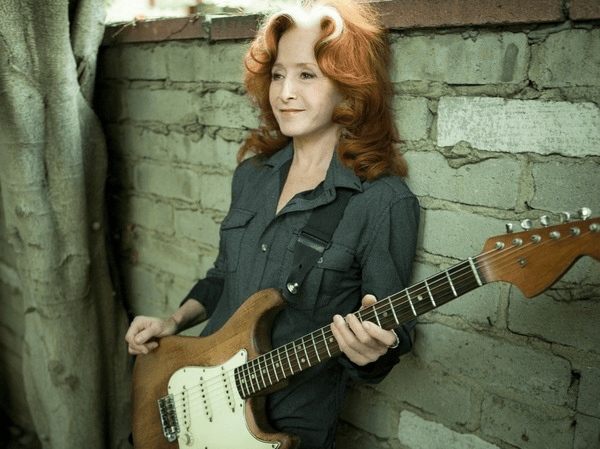

© Marina Chavez
Today, Bonnie Raitt is rightfully considered one of the greatest guitarists alive, and a poignant singer-songwriter as well.
But for years, the music industry had absolutely no idea what to do with her.
In 1971, at age 21, she released her critically acclaimed debut, Bonnie Raitt. But after a long string of poor-selling albums, Warner Bros. Records finally threw up its hands and dropped her.
“I was kind of a cult artist for 20 years,” she says. “It was only after I had some success with the Grammys that I crossed over a little bit.”
She’s referring to 1989′s Nick of Time, her first album for Capitol Records: It won three Grammys, including Album of the Year, and topped the pop charts.
Earlier this year, she released her 18th studio album, Just Like That…, her first album in six years. We spoke with Raitt by phone from her home north of San Francisco. Our conversation has been edited for length.
Your new song “Livin’ For The Ones” sounds like a joyous rocker at first listen. But it’s actually a song about mortality, with some of the most serious lyrics you’ve ever written.
These last two years have been an unbelievable train wreck of loss. But the song is also about all the people I’ve lost in my life. I’m at the age where a lot more people are succumbing to cancer, and I’ve had friends pass away from accidental overdoses or suicide.
It takes its toll. I started feeling that way, about livin’ for the ones who didn’t make it, when my brother lost his eight-year battle with brain cancer in 2009. I told him, “I’m going to live every day for the life you didn’t get to have.”
It’s fun to put a serious song to a rockin’ beat. It’s actually cathartic. Every night when I sing it, it’s a call to arms for me to remind myself not to bitch and moan and whine.
“Waitin’ for You to Blow” is funny at times, but you also seem to be saying some deeper things about addiction and compulsive behavior.
I was definitely inspired by Mose Allison and Randy Newman. I love their satirical point of view and their ability to skewer human foibles and be half serious and half joking.
I’ve been in recovery from drugs and alcohol for 35 years. And I’ve been lucky to manage to stay on that path, a day at a time. But there are still personality defects and ways we slip up, either in white lies we tell our friends, or ways we kid ourselves when we know better, like, “It’s OK to have another piece of cake at midnight.”
I wanted to write about the little devil on your shoulder that’s urging you to mess up, whether you’re an addict or not. We’re all human, and we’re all struggling.
You’ve given credit to several musicians, including Stevie Ray Vaughan, for helping you overcome drug and alcohol addiction. How did they help you?
For a lot of us, when we were in our mid-30s, [substance abuse] was no longer working so great. It became a lot harder for you to recover and remember what you said the night before, and then you couple that with anger and unresolved issues: I got dropped by my label right before a big, long tour and had a romance fall apart, and I kind of medicated myself. Therapy wasn’t going to do it for me.
So I looked around and saw some friends of mine that clearly were in better versions of themselves. I saw Stevie come out of recovery and play one night in Atlanta: He wasn’t sure, but the first time he picked up the guitar, he just burned a hole in the sun. It was a real inspiration.
When I saw him that night, I said, “You know what? That’s it. No more excuses.” It was the last straw. I made the decision, and within a couple of months, I got sober.
You’ve been a strong role model for so many female musicians. What were your experiences in the male-dominated music business decades before the #MeToo movement?
I grew up in show business with my dad [actor John Raitt], so I got a window on how women were devalued and treated as sex objects. As burgeoning feminists in the late ‘60s and early ‘70s, we were already blazing a trail, demanding equal treatment and saying, “Don’t talk to me like that.”
I’m not, like, drop-dead gorgeous, so I probably didn’t get hit on like some less sophisticated young women that are super-gorgeous and not as experienced in show business. I spoke my mind, and I put out a vibe — I used to sing “Under My Thumb” with the sex changed.
When people met me, they met me with respect. I just was never in a position to be treated that way, and if I was, I wouldn’t have put up with it. I would have fought back.
Today, the business itself hasn’t changed as much as it could have. Men are still running the entertainment industry. But it’s great that now, nobody is going to put up with that kind of misogyny and inappropriate behavior. It’s been great that all that got blown out of the water.
I’ve seen you several times in concert where you’ve told some very funny risqué jokes. Have any uptight concertgoers ever complained about your off-color sense of humor?
Not that I ever heard about. Mae West was a big hero of mine from when I was a little kid, and in my 20s, I was definitely playing the part of a blues mama. It was an attempt to get rid of this little high soprano voice and a wimpy exterior. I was trying to seem road-worn.
But there’s a fine line before it becomes grossly raunchy. And eventually, after I got sober and I had enough therapy, I realized I didn’t have to hide behind that persona. I didn’t have to smoke cigarettes and try to be like my older blues heroes.
My brain still comes up with [raunchy] stuff, but I’m able to catch it nowadays. The other night, I told the audience, “I almost said something that the old Bonnie would have said.” After the show, my band said, “What was it?” And I told them. They just rolled their eyes.
I’ve settled down a bit. I’m more mature now. Thank God I came to my senses.
Details
Bonnie Raitt and opening act Marc Cohn perform Oct. 8 at 8 p.m. at Texas Trust CU Theatre, 1001 Texas Trust Way, Grand Prairie. axs.com.
















 Visitors Today : 33
Visitors Today : 33 Now Online : 0
Now Online : 0















































































































